Related Research Articles

In the civil service of the United Kingdom, His Majesty's Exchequer, or just the Exchequer, is the accounting process of central government and the government's current account in the Consolidated Fund. the term is used in various financial documents, including the latest departmental and agency annual accounts.
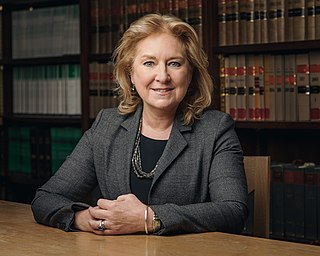
The Lady Chief Justice of England and Wales is the head of the Judiciary of England and Wales and the president of the Courts of England and Wales.
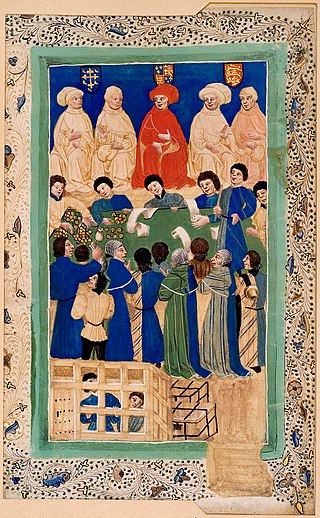
The Exchequer of Pleas, or Court of Exchequer, was a court that dealt with matters of equity, a set of legal principles based on natural law and common law in England and Wales. Originally part of the curia regis, or King's Council, the Exchequer of Pleas split from the curia in the 1190s to sit as an independent central court. The Court of Chancery's reputation for tardiness and expense resulted in much of its business transferring to the Exchequer. The Exchequer and Chancery, with similar jurisdictions, drew closer together over the years until an argument was made during the 19th century that having two seemingly identical courts was unnecessary. As a result, the Exchequer lost its equity jurisdiction. With the Judicature Acts, the Exchequer was formally dissolved as a judicial body by an Order in Council on 16 December 1880.

Henry of Bracton, also Henry de Bracton, also Henricus Bracton, or Henry Bratton also Henry Bretton was an English cleric and jurist.
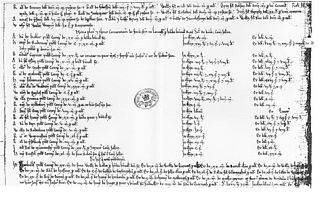
The Pipe rolls, sometimes called the Great rolls or the Great Rolls of the Pipe, are a collection of financial records maintained by the English Exchequer, or Treasury, and its successors,as well as the Exchequer of Ireland. The earliest date from the 12th century, and the series extends, mostly complete, from then until 1833. They form the oldest continuous series of records concerning English governance kept by the English, British, Irish and United Kingdom governments, covering a span of about 700 years. The early medieval ones are especially useful for historical study, as they are some of the earliest financial records available from the Middle Ages. A similar set of records was developed for Normandy, which was ruled by the English kings from 1066 to 1205, but the Norman Pipe rolls have not survived in a continuous series like the English.

A Serjeant-at-Law (SL), commonly known simply as a Serjeant, was a member of an order of barristers at the English and Irish Bar. The position of Serjeant-at-Law, or Sergeant-Counter, was centuries old; there are writs dating to 1300 which identify them as descended from figures in France before the Norman Conquest, thus the Serjeants are said to be the oldest formally created order in England. The order rose during the 16th century as a small, elite group of lawyers who took much of the work in the central common law courts.
In the history of the courts of England and Wales, the writ of quominus, or writ of quo minus, was a writ and legal fiction which allowed the Court of Exchequer to obtain a jurisdiction over cases normally brought in the Court of Common Pleas. The Exchequer was tasked with collecting the King's revenue, and the legal fiction worked by having the plaintiff in a debt case claim that he was a debtor to the king, and that the defendant's debt prevented him paying the King. As such, the defendant would be arrested, and the case heard by the Exchequer. The writ's predecessors were in use from at least 1230, and it was in common use during the 16th century. The use continued into the 19th century, until all original writs were abolished in 1883.
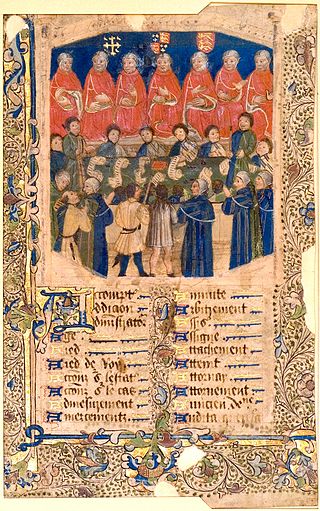
The Court of Common Pleas, or Common Bench, was a common law court in the English legal system that covered "common pleas"; actions between subject and subject, which did not concern the king. Created in the late 12th to early 13th century after splitting from the Exchequer of Pleas, the Common Pleas served as one of the central English courts for around 600 years. Authorised by Magna Carta to sit in a fixed location, the Common Pleas sat in Westminster Hall for its entire existence, joined by the Exchequer of Pleas and Court of King's Bench.
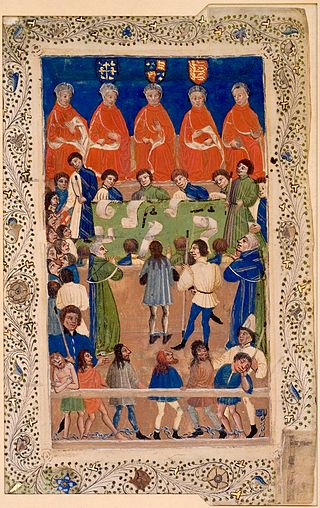
The Bill of Middlesex was a legal fiction used by the Court of King's Bench to gain jurisdiction over cases traditionally in the remit of the Court of Common Pleas. Hinging on the King's Bench's remaining criminal jurisdiction over the county of Middlesex, the Bill allowed it to take cases traditionally in the remit of other common law courts by claiming that the defendant had committed trespass in Middlesex. Once the defendant was in custody, the trespass complaint would be quietly dropped and other complaints would be substituted.

The Court of King's Bench, formally known as The Court of the King Before the King Himself, was a court of common law in the English legal system. Created in the late 12th to early 13th century from the curia regis, the King's Bench initially followed the monarch on his travels. The King's Bench finally joined the Court of Common Pleas and Exchequer of Pleas in Westminster Hall in 1318, making its last travels in 1421. The King's Bench was merged into the High Court of Justice by the Supreme Court of Judicature Act 1873, after which point the King's Bench was a division within the High Court. The King's Bench was staffed by one Chief Justice and usually three Puisne Justices.

The Court of King's Bench was one of the senior courts of common law in Ireland. It was a mirror of the Court of King's Bench in England. The King's Bench was one of the "Four Courts" which sat in the building in Dublin which is still known as "The Four Courts", and is still in use.
The Law Reports is the name of a series of law reports published by the Incorporated Council of Law Reporting.
The Exchequer of the Jews was a division of the Court of Exchequer at Westminster which recorded and regulated the taxes and the law-cases of the Jews in England and Wales. It operated from the late 1190s until the eventual expulsion of the Jews in 1290.

Slade's Case was a case in English contract law that ran from 1596 to 1602. Under the medieval common law, claims seeking the repayment of a debt or other matters could only be pursued through a writ of debt in the Court of Common Pleas, a problematic and archaic process. By 1558 the lawyers had succeeded in creating another method, enforced by the Court of King's Bench, through the action of assumpsit, which was technically for deceit. The legal fiction used was that by failing to pay after promising to do so, a defendant had committed deceit, and was liable to the plaintiff. The conservative Common Pleas, through the appellate court the Court of Exchequer Chamber, began to overrule decisions made by the King's Bench on assumpsit, causing friction between the courts.

The Exchequer of Ireland was a body in the Kingdom of Ireland tasked with collecting royal revenue. Modelled on the English Exchequer, it was created in 1210 after King John of England applied English law and legal structure to his Lordship of Ireland. The Exchequer was divided into two parts; the Superior Exchequer, which acted as a court of equity and revenue in a way similar to the English Exchequer of Pleas, and the Inferior Exchequer, which directly collected revenue from those who owed The Crown money, principally rents for Crown lands. The Exchequer primarily worked in a way similar to the English legal system, holding a similar jurisdiction. Following the Act of Union 1800, which incorporated Ireland into the United Kingdom, the Exchequer was merged with the English Exchequer in 1817 and ceased to function as an independent body, although the Irish Court of Exchequer, like other Irish courts, remained separate from the English equivalent.

The Court of Common Pleas was one of the principal courts of common law in Ireland. It was a mirror image of the equivalent court in England. Common Pleas was one of the four courts of justice which gave the Four Courts in Dublin, which is still in use as a courthouse, its name. Its remit as in England was to hear lawsuits between ordinary citizens.

The Court of Exchequer (Ireland), or the Irish Exchequer of Pleas, was one of the senior courts of common law in Ireland. It was the mirror image of the equivalent court in England. The Court of Exchequer was one of the four royal courts of justice which gave their name to the building in Dublin in which they were located, which is still called the Four Courts, and is in use as a courthouse.
Henry Mitchell (c.1320–1384) was an Irish judge of the fourteenth century. He was one of the first recorded holders of the office of Attorney General for Ireland, and was subsequently Chief Baron of the Irish Exchequer and Chief Justice of the Irish Common Pleas.
John Giffard, or Gyffard was an English-born lawyer and cleric in Ireland in the late fourteenth century, who served briefly as Chief Justice of the Irish Common Pleas.

The government of the Kingdom of England in the Middle Ages was a monarchy based on the principles of feudalism. The king possessed ultimate executive, legislative, and judicial power. However, some limits to the king's authority had been imposed by the 13th century. Magna Carta established the principle that taxes could not be levied without common consent, and Parliament was able to assert its power over taxation throughout this period.
References
- Hastings, Margaret (1947). The Court of Common Pleas in Fifteenth Century England. New York.
{{cite book}}: CS1 maint: location missing publisher (link) - Pleas Before the King or His Justices 1198–1212. Volume IV, Rolls or Fragments of Rolls From the Years 1207-1212 by Doris Mary Stenton.
- The National Archives, Kew.